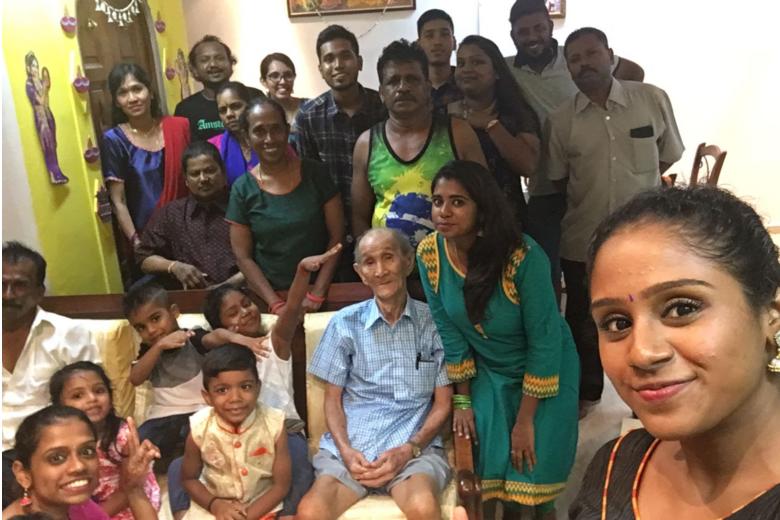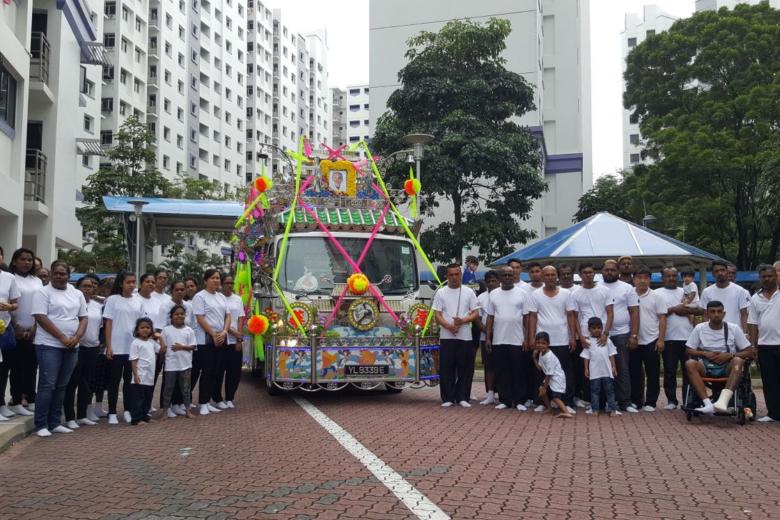A Singaporean love story that broke racial and cultural barriers

SINGAPORE (TABLA!) - Their love story is uniquely Singaporean, and its beauty lies in the sacrifice, kindness and devotion it exemplifies.
When Mr Koh Leng Kiat died at the age of 83 on March 5, his Indian stepchildren and his biological children conducted his funeral the traditional Taoist way even though they had little knowledge of how to do it.
Theirs is a family unlike the norm, a family brought about by an incident that happened in 1966.
That was the year a car accident killed 24-year-old Meena Jaganathan's husband, leaving her with eight children, the youngest of whom was just two months old.
To make ends meet, she joined a construction company as a manual labourer in 1967.

After just a few months on the job, she had appendicitis. Mr Koh, 32, who was her supervisor, took her to hospital where she was warded.
Desperate because there was no one to look after her children, she turned to Mr Koh. To her relief, he agreed to help and headed to her kampung home in Joo Chiat.
What he saw upset him, five boys and three girls with an uncertain future, living in a small house without a father.
Shaken by their predicament, he was determined to do something.
After Madam Meena returned, he started to help out bit by bit, providing financial assistance and buying goods for the family of nine.
To repay his kindness, Madam Meena would often cook and serve him food during his visits to her home.
Slowly but surely, love grew despite language and cultural barriers.
Mr Koh's acts of compassion melted Madam Meena's heart, while her care and concern attracted him.
"Appa (father) loved amma's (mother) cooking a lot. He loved dalcha, mutton curry, chicken curry and fish curry. He often joked that he fell for those dishes," said the couple's first child, Mrs Chitra, 46.
Despite his parents refusal to give their blessing, Mr Koh married Madam Meena in 1970, and the couple lived in her Joo Chiat home.
They had four children of their own - two boys and two girls.
All their children were given Chinese names but were addressed by their Tamil names. Mrs Chitra's Chinese name is Koh Geok Yen.
It was only after Mrs Chitra's birth that Mr Koh's family started to accept his wife and stepchildren.
The stepchildren and the biological children grew up in a tightly knit family that used a variety of languages to communicate.
Madam Meena would communicate with Mr Koh in Tamil. Even though he did not converse in Tamil, he understood the language.
Mr Koh would speak to her and the children in Malay.

Said stepson Mr Nalandran, 58: "We have never heard the conversations between appa and amma. Appa will ask us where amma is. He seldom called her by name."
"Appa and amma both went to work. At one point of time, appa did two or three jobs. After his full-time work at the construction firm ended, he would go for part-time work," recalled Mrs Chitra.
"Appa would take us for outings. We would pack food and take it along. Appa liked to go to the zoo," she added.
When it came to movies, Mr Koh would buy tickets for all the children to watch Tamil films at the theatre.
He would then take his wife for Chinese movie screenings .
"Appa was a good man. He neither smoked nor drank alcohol. He always came home directly after work. He always spent time with us," recalled Mr Nalandran.
He said that in the late 1980s, the family moved into a three-room Housing Board flat in Bedok.
Sadly, Madam Meena died in 1994 at the age of 52. Mr Koh was heartbroken and found it difficult to accept that she was gone.
Mr Nalandran said Mr Koh treated all the children the same way, making no distinction between his stepchildren and his biological children.
"Among the sons, I was the closest to appa. In fact, I was closer to appa than I was to amma," he said, tears streaming down his cheeks.
As Mr Koh loved his children, he often visited them even after they had grown up and started their own families.
He also would not miss his children's and grandchildren's birthdays.
Mr Koh has 24 grandchildren and 17 great-grandchildren who would all converse with him in English.
Fondly recalling her grandfather, Mr Nalandran's daughter, Ms Lingeswari, 29, shared about how he would watch Tamil movies, Chinese dramas and wrestling shows with his grandchildren.
As Mr Koh was in poor health - he had heart problems and used a pacemaker - he lived in Mrs Chitra's home in Hougang for the past few years.
During this period, the entire family would gather at her house for festivals.
Having celebrated Chinese New Year and Deepavali, the couple started celebrating other religious festivals such as Hari Raya Puasa and Christmas after their children married people of different races and religions.
Whatever festival it may be, the entire family would gather to celebrate with Mr Koh.
When the elderly man was hospitalised, though there was a limit of four visitors at any one time, his family members divided themselves into small groups and took turns to visit him within the same day.
"On seeing all of us, appa would gain new strength," said Mrs Chitra with a smile.
Initially, Mr Nalandran and his siblings fondly called Mr Koh "uncle".
But in the final stage of his life, his stepchildren started calling him "appa", which moved Mr Koh tremendously.
"It was only two months ago when my dad told me to conduct his funeral in a Chinese way. He knew that his time was nearing," said Mr Nalandran. "I was his favourite son. He shared everything with me."

After Mr Koh died early this month, his stepchildren and biological children conducted the funeral according to his wishes.
The children were dressed in traditional funeral clothes, there was a band and everything was done according to Taoist tradition.
During the three-day wake, the family cooked non-vegetarian dishes and served them to those who attended.
They folded and burnt gold, silver and bronze notes. They also lit incense sticks.
The children, Mr Koh's elder sister and some of his family members all took part in the rituals and Mr Koh's body made its final journey in a multi-coloured hearse.
"He was our loving father. We did what we could to make sure his soul rests in peace," said Mr Nalandran.
" I wish he will be my father in my next birth. He was a very, very good man. I never cried so much, not even when my mother passed away. I simply could not bear his loss."